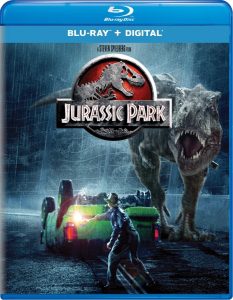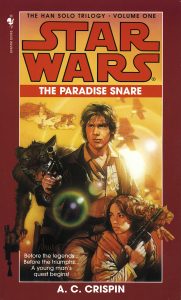By lucky coincidence, I wrapped up re-reading “The Paradise Snare” (1997), the first book of A.C. Crispin’s “Han Solo Trilogy,” just as Disney announced plans for a young Han Solo movie. If the film is going to be a tightly plotted adventure, it won’t necessarily touch on the events of these books, but if the filmmakers want to do Han’s origin story, Crispin’s trilogy is their definitive source material.
In these three books, which take Han from a teenage petty thief to his spot in the cantina booth in “A New Hope” as a cynical man of about 30, Crispin does an outstanding job of chronicling a significant amount of time without making it feel like you’re reading a biography. Certainly, these books aren’t straight-up adventure yarns like Brian Daley delivered in the “Han Solo Adventures” (those all take place within the third Crispin book, by the way); these are more sprawling, in the tradition of “Star Wars” movies. But Crispin does allow time for tense plotting along with the character growth that makes these books must-reads — these are the essential Han Solo prequels just as Episodes I-III was the essential Anakin Skywalker prequel.
The bulk of “The Paradise Snare” — which doesn’t feature Chewbacca or the Millennium Falcon — takes place on Ylesia, where we get a critique of religion and slavery along with a chaste but sweepingly emotional romance yarn between Han and Bria Tharen. Han, having escaped his life as a pickpocket in the service of Garris Shrike on Corellia, gets his first job as a pilot for the t’landa Til priests, who run the backwater planet’s religious retreat/illegal spice-packing facility. Bria is one of the workers who needs her fix of the Exultation, supposedly a religious experience but really just alien brain waves.
Crispin deftly tiptoes through Han’s character traits here — on one hand, he’s always looked out for himself rather than getting involved in “hokey religions” or political rebellions. And he’d probably be happy to just run the spice and cash his checks, except that he’s also a hopeless romantic, despite his scruffy exterior. Even at a young age, he knows how to put his “best lopsided grin” to good use as he brings Bria out of her shell. Crispin does a nice job of chronicling Han’s joy and pain, and after his experiences in “The Paradise Snare,” a reader can understand why he’d learn to hold his heart a bit closer to his vest, just as he does with credit vouchers.
One character trait that jumped out at me here, in light of the current gun-control debate, is how Han feels naked without a blaster at his hip. On Coruscant, weapons must be checked at the landing pad. The more sheltered Bria argues that since no one has weapons, everyone’s on even footing. Han tells her not to be so naive. Crispin goes on to explore the scary underlevels of Coruscant (where a blaster is a must for survival), although this segment moved a bit too briskly for my taste.

At first, I found it hard to wrap my head around the idea that Alderaan has no weapons at all (even the police don’t carry them), although it seems more feasible if you consider it not as a planet equivalent to the isolated Earth, but rather as a community within a wider culture. Still, I think it’s odd that when Han seeks to unload some illegal spice on the utopian Alderaan, he finds other dealers who tell him there’s no market there — why are they there in the first place, then?
There are rare moments like these where one could legitimately accuse Crispin of being a bit too broad and cartoony, sort of like Kevin J. Anderson’s “Jedi Academy Trilogy.” And certainly, I wouldn’t describe “The Paradise Snare” as “gritty,” like Daley’s trilogy is. Crispin has a crisp style, and her adherence to a hero’s journey arc might turn off more cynical readers. For me, though, there’s too much juicy stuff in this trilogy to dismiss.
The second book, “The Hutt Gambit,” will get into more of the essential Han Solo history — his time as an Imperial cadet. We saw how Luke, who also dreamed of joining the military, learned to hate the Empire in “A New Hope,” but Han was way ahead of him. Crispin will continue to strip away the last vestiges of Han’s innocence as the trilogy moves forward.
I’ll review “The Hutt Gambit” and “Rebel Dawn” in upcoming posts, but in the meantime: What are your thoughts on a young Han Solo film? Should it adapt Crispin’s novels or be a brand-new story? And who should play the young Han?
Trivia time: “The Paradise Snare,” as far as I could tell, has exactly one apocryphal element that owes to it being written before “The Phantom Menace” was released in 1999. A question on Han’s academy entrance exam refers to “President Palpatine” rather than “Supreme Chancellor Palpatine.” Crispin was no doubt drawing from the prologue to the “A New Hope” novelization, which got a few details wrong in the chronicle of Palpatine’s rise to power.

